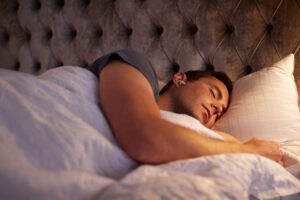At a Glance:
- Dolphin respondents who sleep on hybrid mattresses sleep the longest and are most likely to report above-average sleep quality compared to dolphins who sleep on other mattress types.
- Compared to lions sleeping on foam mattresses, lions with hybrid mattresses sleep an extra 20 minutes more a night, are more likely to fall asleep within 20 minutes (66.7% versus 53.3%) and more likely to rate their sleep quality above average (87.9% versus 65.7%).
- Wolf respondents sleep the longest on hybrid mattresses–26 minutes more than innerspring and 32 minutes more than foam mattresses–but they sleep more soundly on a foam mattress, with 75.7% reporting above-average sleep quality.
- Only 8% of bear respondents sleep on air mattresses, but they log the most sleep–11 more minutes a night than those with hybrid mattresses. And bears with air mattresses are most likely to say their sleep quality is above-average (86.7% versus 75.3% with innerspring, 71.4% with hybrid, and 69.5% with foam mattresses).
Sleep doesn’t come easily to Sarah Boles, a 39-year-old mother with attention-deficit/hyperactivity disorder (ADHD) from Kansas City, Missouri. “It’s hard to fight through the mountain of stuff to think about as I lay in bed,” she says. Cuddling with her child at night sometimes helps. “If I don’t fall asleep when I lay down with our 4-year-old, then I have to fall asleep on my own. And that takes a while,” she says.
According to Dr. Michael Breus, Ph.D., of Sleep Doctor, Boles’s sleep issues are classic for a dolphin, one of the four chronotypes that influence our ideal wake and bedtimes. Dolphins typically have trouble finding a consistent sleep schedule that works for them. “They often have anxiety and like to be cuddled,” he says.
Besides dolphins, the three other chronotypes defined by Dr. Breus are lions, wolves, and bears. Like Boles, 41.8% of respondents in a May 2023 survey by Sleep Doctor identify as dolphins. Another 20.7% are lions, who tend to wake and go to bed early, while 15% are wolves, the classic night owls who feel most energetic when they wake later in the day.
Bears are the most common chronotype making up about 55% of the population, according to Dr. Breus, but just 15.3% of survey respondents identify as bears. They generally feel most energetic before noon, but their drive declines later in the afternoon. (Take the quiz to find out your chronotype.)
Dr. Breus suggests adjusting our sleep schedules to fit our chronotypes to get good rest. But what about our sleep environments? In particular, will choosing a mattress based on your chronotype help you get a good night’s sleep? Here’s a look at the four chronotypes and some of the most popular mattress types.
The Sensitive Sleepers
Dolphins are sensitive sleepers, easily affected by disturbances. In the survey, dolphins have the shortest sleep of all chronotypes, averaging 6 hours, 51 minutes per night. That’s 41 minutes less sleep than bears and lions (who average 7 hours, 32 minutes) and 31 minutes less sleep than wolves (who clock 7 hours, 22 minutes).
Dolphins are also most likely to rate their sleep quality as poor, with 25.1% reporting poor sleep compared to 6.5% of wolves, 8.6% of lions, and 5.9% of bears.
Sarah Lamagna, a 38-year-old self-described dolphin, averages just 5 hours of sleep per night, much less than the recommended 7 hours per night. The New Hampshire resident often struggles to stay asleep.
“I worry throughout the night and wake up wondering if I remembered to sign my kid up for a swim class or if the state got our 1099-Q form back,” she says.
Lamagna sleeps on a hybrid mattress, which may be in her favor. A hybrid mattress combines a coil support system with generous comfort layers. Dolphin respondents who sleep on hybrid mattresses sleep the longest, averaging 12 more minutes a night than those with foam mattresses and 19 more minutes than those with innerspring mattresses. Dolphins with hybrid mattresses are also most likely to report above-average sleep quality (40.7% versus 39.2% of foam mattress sleepers and 29.3% of those with innerspring beds).
For dolphins who fall asleep more easily with cuddling, Dr. Breus suggests a pillow top or contouring mattress to mimic a hugging sensation. “They like to sleep in a bed rather than on it,” he says.
The Early Risers
Lions are among the better sleepers in the survey. These early risers fall asleep the fastest, with more than half (54.9%) falling asleep within 20 minutes versus 47.9% of bears, 40% of wolves, and just 28% of dolphins.
Laraine Adams, a 41-year-old marathon runner, is a typical lion. “I awake at 6 a.m. every day without an alarm,” she says. “I rarely have sleep issues, except I do get hot at night.”
According to Dr. Breus, lions like Adams are often athletic and run hot. To help them sleep better, he recommends avoiding memory foam to prevent overheating. “Try a firm bed with good edge support so you can sit and do stretches,” he advises.
Lions might do well to follow his advice. Foam mattresses are the most popular type among lions, with 41.2% choosing them, but hybrid mattresses typically offer better temperature control and edge support. In the survey, lions sleep the longest on hybrid beds–an extra 20 minutes more a night than on foam beds. Lions with hybrid mattresses are also more likely to fall asleep within 20 minutes than those sleeping on foam (66.7% versus 53.3%) and more likely to rate their sleep quality above average (87.9% versus 65.7%).
Shop the Best Mattresses of 2023The Late-night Loungers
In the survey, wolves run in the middle of the pack for sleep length, averaging 10 minutes less a night than lions and bears but 31 minutes more than dolphins. Most (66.5%) rate their sleep quality as above average.
Wolf respondents sleep the longest on hybrid mattresses–26 minutes more than innerspring and 32 minutes more than foam mattresses–but they sleep more soundly on a foam mattress. Fully three-quarters of wolves with foam mattresses (75.7%) report above-average sleep quality compared to 59.3% with hybrid mattresses and 56.1% with innerspring mattresses.
Just 4.9% of wolves say they sleep on latex mattresses, but perhaps more should consider them. While usually more expensive than other types, latex mattresses are generally firmer and offer more support.
“Wolves are often creatives who spend time in bed not sleeping, so the additional support will help,” Dr. Breus says.
The Average Bears
Bears tend to wake up and go to bed with the sun. In the survey, bears have the best sleep quality of all chronotypes, with almost three-quarters (73.4%) rating it above average compared to 69.4% of lions, 66.5% of wolves, and one-third (34.7%) of dolphins. Bears are also the least likely to report poor sleep quality.
Bears with innerspring mattresses are likelier to report above-average sleep quality, with 75% saying so versus 71.4% with hybrid mattresses and 69.5% with foam mattresses. Yet, bears with hybrid beds sleep 21 minutes longer than those with foam and 31 minutes more than those with innerspring mattresses.
Although only 8% of bear respondents sleep on air mattresses, they log the most sleep, averaging 8 hours, 4 minutes a night. That’s 11 more minutes a night than bears with hybrid mattresses, almost half an hour more than those with foam beds, and 47 minutes more than those with innerspring mattresses. And bears with air mattresses are most likely to say their sleep quality is above-average (86.7% versus 75.3% with innerspring, 71.4% with hybrid, and 69.5% with foam mattresses).
That bears can get a good night’s sleep on an air mattress may be surprising to some, but according to Dr. Breus, “This group likes just about anything.”
Methodology
The survey commissioned by Sleep Doctor was conducted on the online survey platform Pollfish on May 15, 2023. Results are from 1,250 survey participants in the United States who were ages 18 and older at the time of the survey and who reported they slept on a mattress as their primary bedding. All respondents attested to answering the survey questions truthfully and accurately.
References
Consensus Conference Panel, Watson, N. F., Badr, M. S., Belenky, G., Bliwise, D. L., Buxton, O. M., Buysse, D., Dinges, D. F., Gangwisch, J., Grandner, M. A., Kushida, C., Malhotra, R. K., Martin, J. L., Patel, S. R., Quan, S. F., Tasali, E., Non-Participating Observers, Twery, M., Croft, J. B., Maher, E., … Heald, J. L. (2015). Recommended Amount of Sleep for a Healthy Adult: A Joint Consensus Statement of the American Academy of Sleep Medicine and Sleep Research Society. Journal of clinical sleep medicine : JCSM : official publication of the American Academy of Sleep Medicine, 11(6), 591–592. https://pubmed.ncbi.nlm.nih.gov/25979105/
Ask the Sleep Doctor
Have questions about sleep? Submit them here! We use your questions to help us decide topics for articles, videos, and newsletters. We try to answer as many questions as possible. You can also send us an email. Please note, we cannot provide specific medical advice, and always recommend you contact your doctor for any medical matters.






